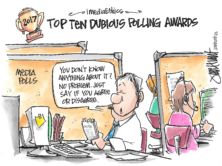The Guardian published this image of Ugandan newspaper, Rolling Stone's outing issue. (Credit: The Guardian, The Rolling Stone)
Ugandan media have been ordered by the courts not to “out” homosexual people, the BBC reported.
The ruling came after Ugandan weekly newspaper The Rolling Stone (not the same as the U.S. magazine) published in October “several lists of people its editor said were gay.”
At least 100 people were outed in the series of stories that “claimed that the country’s homosexual community aimed to ‘recruit 1,000,000 children by 2012,'” according to the Guardian.
As a result of the outed people’s names and photos being in the newspaper, “many said they were attacked.” As the BBC noted, “homosexual acts are illegal in Uganda.”
Not only were the names and images published, but reportedly one article outing people was headlined “Hang them,” according to the BBC.
Financially, the newspaper was instructed to pay all legal costs in the trial and about $650 to three “known gay rights leaders.”
One of the three “known gay rights leaders,” Pepe Julian Onziema, called the media responsible for poor treatment of gays.
She is quoted as saying
“A lot of the danger that we have been facing has been the result of the local media here. It’s basically set a standard for the media to begin treating us as humans, as part of the community.”
“This ruling is a landmark not only for sexual and other minorities living in Uganda, but also an important precedent for other countries facing similar issues,” the Civil Society Coalition on Human Rights and Constitutional Law in Uganda said in a statement.
Afrik News reported that the high court judge who decided the case, Justice Kibuuka Musoke, wrote “in parts” in his ruling:
“Gays are also entitled to their rights. This court has found that there was infringement of some people’s confidential rights. The court hereby issues an injuction restraining Rolling Stone newspaper from future publishing of identifications of homosexuals.”
The Rolling Stone’s editor, Giles Muhame, reportedly found some of the people on a “gay dating website.”
When the stories were published last year, Muhame defended the publication, calling it his journalistic responsibility to “expose the evil in our society,” the Guardian reported.
iMediaEthics is writing The Rolling Stone for comment.
UPDATE: 1/6/2011 12:31 PM EST: The Rolling Stone intends to appeal the ruling. See our update brief here.
The Rolling Stone’s managing editor Giles Muhame responded to StinkyJournalism’s e-mail inquiry, redirecting us to this note he posted on Facebook. In the Jan. 3 note, Muhame commented that the homosexual people the newspaper outed were already pictured on “gay-networking website – gaydar.co.uk.” He claimed that the ruling “puts media freedom at stake.” See his note here.






